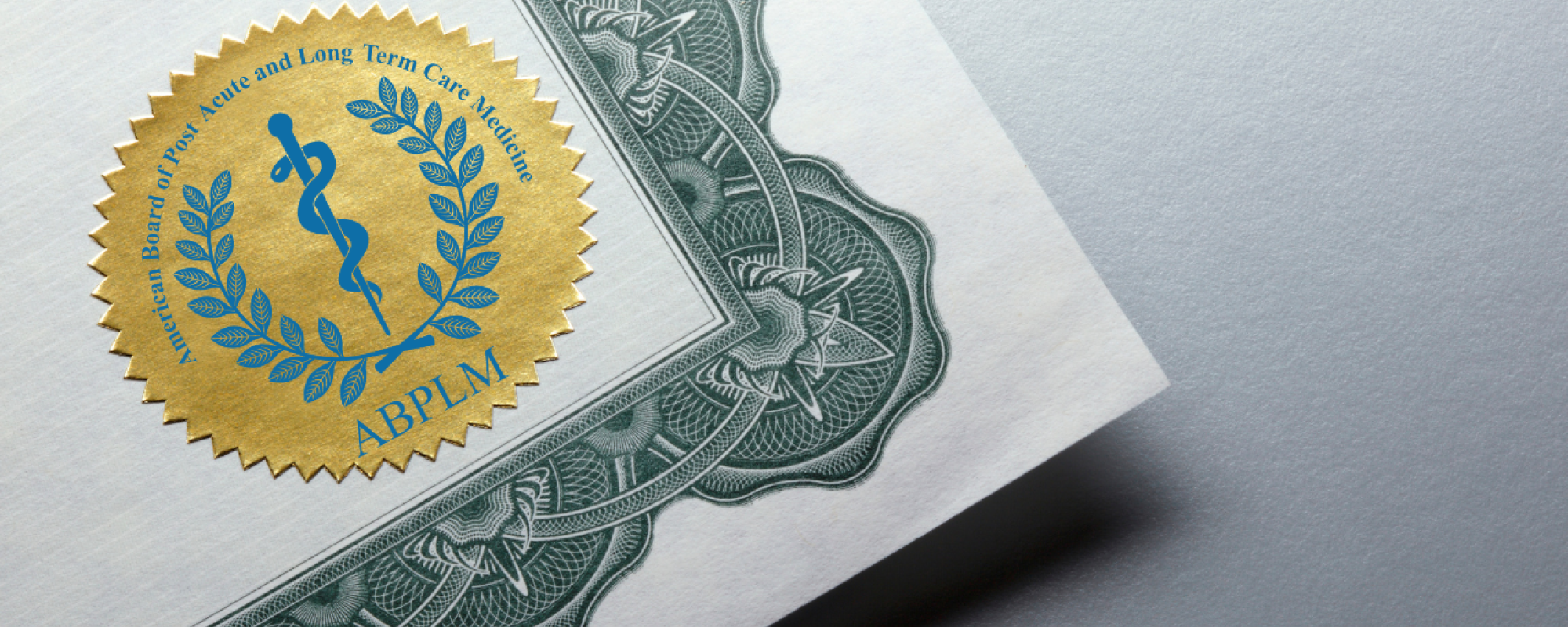California
California Legislation Mandates CMD Certification for Skilled Nursing Home Medical Directors
California Assembly Bill AB 749 requires nursing home medical directors in California to be certified by the American Board of Post-Acute and Long Term Care Medicine (ABPLM). AB 749 will help ensure that every medical director in California is prepared to provide effective oversight of quality and safety in their nursing homes.
A medical director already employed in a skilled nursing facility as of January 1, 2022, has five years (until January 1, 2027) to become a Certified Medical Director.
Skilled Nursing Facility (SNF) Change of Medical Director
For facilities completing form HS215A from the California Department of Public Health Centralized Applications branch, contact the ABPLM at cmd@paltc.org for a letter to confirm a physician's initiation into the process to become a Certified Medical Director. Confirmation can be provided upon registration for the required Core Curriculum Course or upon application for CMD certification.
California Department of Public Health
Licensing and Certification Program
Centralized Applications Branch
CAB@cdph.ca.gov
Maryland
Medical Director Qualifications. The nursing home shall:
- Designate a medical director who has at least the following qualifications:
- A current license as a physician in this State;
- At least 2 years of experience or specialized training in the medical care of geriatric or chronically ill and impaired residents; and
- Successful completion of a curriculum in physician management or administration from:
- AMDA: The Society for Post-Acute and Long-Term Care Medicine; or
- A curriculum approved by the Department or its designee;
- Have a written agreement with a medical director that specifies the medical director's duties and roles and the authority to adequately discharge those responsibilities; and
- Submit a copy of the medical director's credentials to the Department upon a change in the medical director.
The requirement specified in §A(1)(c) of this regulation becomes effective 3 years after the effective date of this regulation, but the medical director shall begin the educational process in physician management or administration within the first year from the date of employment as a medical director.
Pennsylvania
In addition to the requirements of 42 CFR 483.70(h) (relating to administration), the medical director of a facility shall be licensed as a physician in this Commonwealth and shall complete at least four hours annually of continuing medical education (CME) pertinent to the field of medical direction or post-acute and long-term care medicine. The medical director may be designated for single or multiple facilities. There shall be a written agreement between the physician and the facility.
The medical director’s responsibilities shall include at least the following:
- Ensuring the appropriateness and quality of medical care and medically related care.
- Assisting in the development of educational programs for facility staff and other professionals.
- Working with the facility’s clinical team to provide surveillance and develop policies to prevent the potential infection of residents in accordance with the infection control requirements under 42 CFR 483.80 (relating to infection control).
- Cooperating with facility staff to establish policies for assuring that the rights of individuals are respected.
- Supporting and promoting person-directed care such as the formation of advance directives, end-of-life care, and provisions that enhance resident decision-making, including choice regarding medical care options.
- Identifying performance expectations and facilitating feedback to physicians and other health care practitioners regarding their performance and practices.
- Discussing and intervening, as appropriate, with a health care practitioner regarding medical care that is inconsistent with current standards of care.
- Assisting in developing systems to monitor the performance of health care practitioners, including mechanisms for communicating and resolving issues related to medical care and ensuring that other licensed practitioners who may perform physician-delegated tasks act within their scope of practice.
